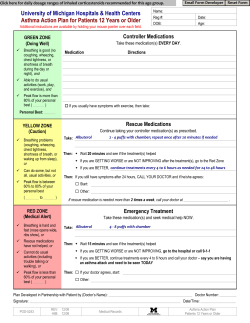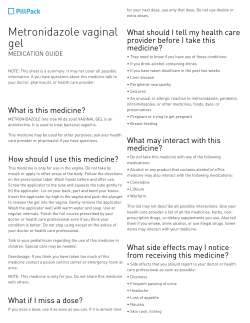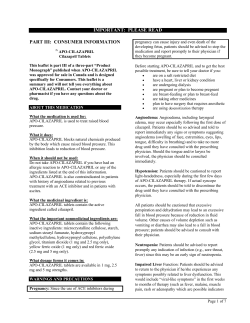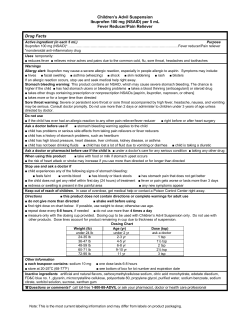
Using Methadone for Chronic Pain 2014
2014 Using Methadone for Chronic Pain Using Methadone for Chronic Pain How can methadone help me? Methadone is an opioid analgesic (painkiller). It is often used to manage cancer and non-cancer pain (chronic pain). It is a good alternative to other opioid pain medications. It is less expensive than other options. How do I take methadone? • You must take this medication exactly as your doctor tells you to. • Only increase or decrease your dose exactly as your doctor tells you. • Do not stop taking it suddenly or you may have withdrawal symptoms. • Methadone may be taken with or without food. When do I take it? • It is best to take the medication at evenly spaced times during the day (every 8-12 hours). How often you take a dose is different from person to person. Please follow the dosage schedule prescribed by your doctor. 1 What will I do if I miss a dose? If you miss a dose, take it as soon as possible. Do not take the missed dose if it is within 4 hours of your next dose. Return to your regular schedule. Some special precautions • Talk to your doctor before taking this medication if you are pregnant or breast-feeding. • Do not stop taking this medication unless your doctor tells you to. • Increase or decrease your dose exactly as your doctor tells you to. This will help you get the best pain relief and the fewest side effects. • Methadone stays in the body longer than other pain medications and can build up in your system. This means that you should be monitored closely by your doctor and/or pain management unit nurse when starting the medication. • Do not stop taking this medication suddenly as you may have withdrawal symptoms. If your doctor asks you to decrease, increase, or discontinue it, your dose will be changed slowly over time. • Tell your dentist, new doctors, or pharmacists that you are taking methadone. • It may make you light-headed or drowsy. Make sure you know how you react to this medication before you drive, use machines, or do other jobs where you need to be alert and able to see well. 2 • Do not drink alcohol. • Check with your doctor before you take any other medications. • Call your doctor or the Pain Management Unit (902) 473-4130 if you have increasing pain for more than 1 week. What side effects can happen while I am taking methadone? You may have some side effects when you start taking it. Many side effects will pass within 2 weeks. Call your doctor or the Pain Management Unit if any of the following continue for a period of time or are bothering you: • Headaches • Dizziness and/or vertigo • Drowsiness • Constipation • Nausea • Muscle twitching or lack of control • Confusion • Hallucinations • More sensitivity to pain • Sweating 3 Call your doctor right away if you: • Are very tired • Are sleeping all the time • Have confusion and/or hallucinations • Have slowed breathing or any breathing problems Where will I store my methadone? • A locked box is strongly recommended. • Keep this and all other medications out of the reach of children. • Liquid form medication should be stored in the fridge especially in a locked box since there are other items such as food and/or drinks in the fridge. • Liquid form medication can be taken as is or mixed with juice. • Store tablets at room temperature (15-30° Celsius). • Do not store them in a damp place such as the bathroom. If you have any questions, please ask. We are here to help you. 4 Notes: Looking for more health information? Contact your local public library for books, videos, magazines, and other resources. For more information go to www.library.novascotia.ca Capital Health promotes a smoke-free and scent-free environment. Please do not use perfumed products. Thank you! Capital Health, Nova Scotia www.cdha.nshealth.ca Prepared by: Pain Management Unit Illustration by: LifeART Health Care 1 Images, Copyright © 1994, TechPool Studios Corp. USA Designed by: Capital Health Library Services, Patient Education Team Printed by: Dalhousie University Print Centre The information in this brochure is provided for informational and educational purposes only. The information is not intended to be and does not constitute healthcare or medical advice. If you have any questions, please ask your healthcare provider. PM85-0686 Revised May 2014 The information in this pamphlet is to be updated every 3 years.
© Copyright 2025





















